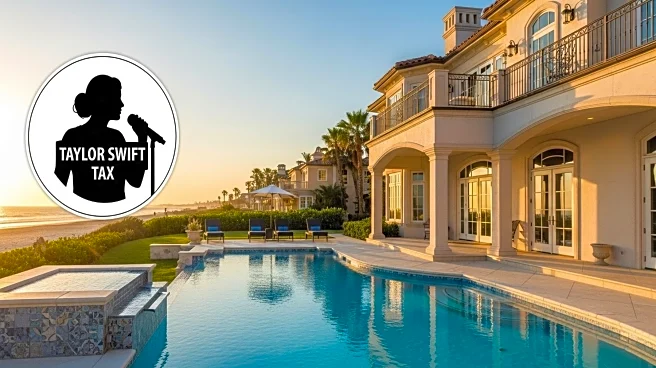What's Happening?
Rhode Island has introduced a new tax targeting luxury second homes valued over $1 million, which are unoccupied for more than half the year. This levy, informally dubbed the 'Taylor Swift Tax,' will impact homeowners like Taylor Swift, whose $28 million Watch Hill estate will see an increase in annual property taxes from approximately $201,000 to $337,442. The tax aims to generate revenue to offset budget cuts and reinvest in housing, as the luxury market continues to thrive while many working families struggle to afford homes. The tax has sparked controversy among real estate brokers who argue it unfairly targets wealthy homeowners who contribute significantly to the local economy.
Why It's Important?
The introduction of the 'Taylor Swift Tax' highlights a growing trend among states to leverage taxes on luxury properties to address budgetary shortfalls and housing affordability issues. This move reflects a broader strategy to redistribute wealth from affluent property owners to support public services and housing initiatives. While the tax may generate necessary funds for the state, it also raises concerns about potential negative impacts on local economies reliant on wealthy residents. The debate underscores the tension between economic equity and the role of affluent individuals in local economies, with implications for similar policies in other regions.
What's Next?
As Rhode Island implements this new tax, it remains to be seen how wealthy homeowners will respond. There is potential for some to relocate or reduce their investment in the area, which could affect local businesses that benefit from their spending. Other states, observing Rhode Island's approach, may consider similar measures to address their own economic challenges. The effectiveness of the tax in achieving its intended goals will likely influence future policy decisions both within Rhode Island and beyond.
Beyond the Headlines
The 'Taylor Swift Tax' raises broader questions about the ethical responsibilities of the ultra-wealthy in contributing to societal welfare. It also highlights the cultural shift towards holding affluent individuals accountable for their economic impact on communities. This development may prompt further discussions on wealth distribution and the role of taxation in promoting social equity.









